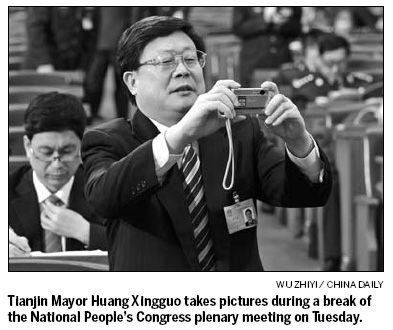Tianjin spreads wings to become powerhouse
Tianjin used to take a back seat to other cities, and was defined only by its relation to Beijing.
But Tianjin Mayor Huang Xingguo said the municipality will soon develop into an economic center of North China and he is determined to bring more projects and investment to the city.
"We have no choice but to leap forward. Under intense regional competition nationwide, we'll be lagging behind if we just make small progress," Huang told China Daily on the sidelines of the National People's Congress (NPC) session in Beijing.
 |
Huang said his strategy to maintain Tianjin's economic growth during the financial crisis is to attract large industrial projects.
About 940 major projects have led to an investment of nearly 2 trillion yuan (US$294 billion) in the area since 2007.
These projects include an aircraft assembly line, a next-generation space launch vehicle center, a large oil refinery and a shipyard.
Airbus has already delivered 15 A320 aircraft since its assembly line began operation in Tianjin in September 2008. It plans to assemble and deliver another 26 planes in 2010.
The aviation and aerospace sectors have grown into pillar industries, making Tianjin the only city that owns both industries, said Huang, who is also a NPC deputy.
Huang, who is originally from Zhejiang, said while Shenzhen is the frontline of China's opening-up campaign, and Shanghai's Pudong is a pilot area for a market economy system, Tianjin's Binhai New Area, a major economic development zone, will evolve into the leading area for scientific development in China.
Binhai New Area's GDP now accounts for more than half of the municipality's total GDP, and plays a leading role in Tianjin's development.
According to the mayor, flexible financing measures are crucial to attracting large projects to the area. He has promoted innovation in financial products and services for these projects.
Currently 355 equity funds and venture capital funds are registered in Tianjin. Huang said few other regions have such a large number of investment funds.
"Since I came to Tianjin, great importance has been attached to financial reform and innovation," Huang said.
"In recent years, we have set up a number of financing and investment platforms with large-scale capital inflow, powerful financing and investment capability and high levels of market orientation."
In order to broaden these investment channels, Tianjin will participate in regional economic conferences, and host the Summer Davos Forum in September, the Tianjin Trade Fair and other investment and trade talks.
About 1,500 delegates are expected to attend the Summer Davos economic forum, among which 80 percent will be international delegates. The total number of participants is expected to reach 10,000 and will include 900 multinational company executives.
"The holding of large-scale international conferences, such as the Davos Forum, will substantially strengthen Tianjin's capability in terms of marching on globally and expanding its international influence," Huang said.
"Obviously, that will benefit Tianjin's economic development and the opening-up of the Binhai New Area."
 0
0 






